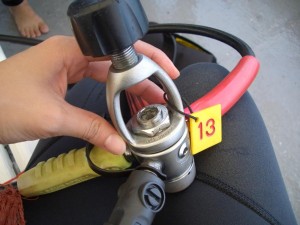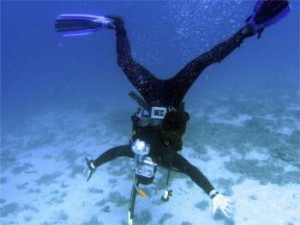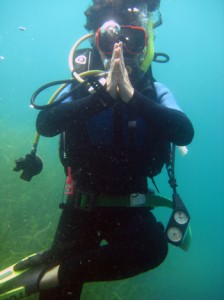Everybody Is An Expert…
There is a rule on every dive boat that is neither written nor spoken, yet every diver abides by it: if you perceive yourself to be a more experienced diver then you must thrust your advice onto the novice diver, whether it is sought or not. Usually this makes for either an enlightening discussion or, at least, a nice ice breaker…but sometimes you meet “that guy” who traps you at the coffee station on the boat and doesn’t let you go until he has imparted every single ounce of his hard earned wisdom onto you. The worst thing that can possibly happen to a fresh and eager Open Water student on his last day of the course is to get trapped into a lecture from two old divers who “have been in it since the beginning”. These guys will undermine instructors, give twisted advice and, worst of all, “teach” the kid how to breathe on SCUBA.

Many Of The “Old Guard” Would Have You Believe They Were Good Buddies With Cousteau Himself!
This is a problem because breathing is as personal and unique as a fingerprint. It is directly controlled by the most primitive section of the brain and it is one of the first things to respond when the body or mind get excited in any way. Regaining conscious control of this most primal of functions is a personal challenge that cannot be taught. The tricks and tips that most old salty divers give is often counterproductive because it is forcing an unnatural rhythm onto the body and mind.
What I’d like to do here is try to give advice that you can modify to meet your own personal needs. These are not gospel truths, but handy tips that can help you maximise your bottom time and relieve the some of the stress of worrying about being the diver that cuts the dive short for everyone else. Don’t worry about your air consumption, it can be improved – my air was a constant concern for me throughout my Divemaster Trainee course because I knew that I was expected to come up with more air than my divers, and I’d come up with the same as them. By the end of my DMT my air consumption was much better, purely by practicing and exploiting these tips.
This list is in reverse order, though you may find anyone of them is the key to vastly improving your air consumption.
10. Avoid Currents/Cold/Bad Viz
This is a difficult tip for some to follow, especially if you dive in Northern Europe regularly! Bad conditions are a part of diving, and they make diving in clear, warm water feel extra special. The problem is that for almost all divers it’s hard to stay calm and control their breathing if they can’t see their hand in front of their face or have to swim hard to get to where they are going against heavy current. Air consumption is always affected by the cold, and by that I mean how cold you are, not the sea. You could be diving an ice dive in near freezing water and be nice and toasty in your dry suit and three layers of thermal clothing, alternatively you could be diving in thirty degree Celsius water and get chilled to the bone in twenty minutes because you’ve had to sit still waiting for your student to finish his skills. If your body gets cold then your air consumption will suffer.
The moral here is to ensure you are prepared for bad conditions (and good ones) by being well versed in the techniques required to dive safely, and by having the appropriate equipment for the job. If you do this then your air is sure to improve.
9. Stay Shallow
Another tough trick to follow when you’re a deep freak. Many divers are scuba jockeys purely so they can get ridiculously deep and feel the buzz. The problem for some of these guys (especially the big ones) is they suck air down at a crazy rate. When you go deep the air compresses and you end up sucking much more air out of the tank than at the surface. The answer here is to ensure the diver stays shallow right? Wrong. If the diver wants to go deep but his air consumption is useless then the best thing he can do is ensure that on the travel dive (to and from the deep spot) he stays very shallow and then descends straight to the deep site (near vertical descent and steep ascent). This will allow him to maximise his deep bottom time and stop him from wasting it on a lengthy descent. Acquired cake and consumed it!
8.Maintain Your Gear
Dive equipment is a strange set of tools because it is extremely important that they all function seamlessly with one another and are in perfect condition, yet many people abuse their gear as though it were a pair of work boots i.e. little or no maintenance. If your gear is left to sit in a shed, garage or dive shop for a long time, or you use it regularly but don’t clean and service it often then you will eventually come across serious leaks. These leaks are often ignored because the diver has dived with them for a while, but they can have a grave impact on your rate of air depletion (especially if you go deep – leaks get bigger as you go down). It takes very little time to rinse your gear after a dive, ensure the O-rings are all fresh and to put your gear into a shop every six months or so for a full service.

Regular, Light Maintenance Of Seals And O-rings Will Save Air And Prevent Complications On A Dive.
7. Watertight Mask
This tip is close to my heart because it took me a full ten dives to realise that my air was going down so fast because I was constantly clearing my mask. My problem was that I had a short beard which was letting in a fair rate of water (about half a mask full every minute) and I was taking regular deep breaths and exhaling through my nose which meant I was loosing loads of breathing time. The solution was simple when I realised my problem and I shaved myself back to my boyish look. I could have used Vaseline to create a seal between my beard and mask, but I’m simply not that vain to worry about my looks – the designer stubble was sacrificed for the greater diving good. Novice divers also often don’t realise that there are many masks out there that are better or worse than their current mask because they’ve only ever owned one, these guys would be rewarded with more air for doing a little research and checking to see if they can find a better seal with another unit.
6. Refine Your Fin Technique
Most instructors are excellent at fully breaking down the various pieces of equipment in a scuba setup, yet they often forget that most people have never used a pair of fins. These newbies tend to get the hang of the fins quickly, but their techniques are usually fairly stilted and inefficient. For those divers that have got a bit of experience and are looking to get into diving as a serious pursuit then I urge you to begin practicing with new finning styles. The style that works for you depends on the diver’s body shape, their fitness, the type of fins they are using and the circumstances. In my case I was floundering with my new fins (Jetfins) until I forced myself to learn how to frog kick with fins. Now I am very efficient, fast, controlled and strong with my fins which has had a great effect on my air consumption. Try other fins and new finning techniques to find what works for you. The key is to be smooth with whatever style you choose, water moves well when it flows, but is like concrete when you try to jerk against it.
5. Good Buoyancy
Like refining your swimming style it is also important that you optimise your buoyancy control. The better you are able to manage your position in the water, the less effort you will require to compensate by swimming up or down. Most new divers swim at a forty-five degree angle with their head up or their feet up, this means that half of their swimming power is being used to keep them at their chosen depth (which means that a large quantity of their air is being wasted). If a diver can stay horizontal at the depth they require then they will use less energy and less air.
It is also important to think about weighting. If a diver is poorly weighted then they may float in a strange orientation (and waste their swim power again as above) or if they are too heavy then they will need to inflate their BCD to compensate for the added lead. This inflated BCD restricts your movements and creates excess drag. Perfect weighting means an almost empty BCD at the bottom and a streamlined profile, which means less effort, more air in the tank and longer dives…

Perfect Buoyancy Helps To Point Your Fins In The Right Direction, Which Is More Efficient And Thus Saves Air…
4. Fitness
Here’s a shocker: big, unhealthy guys and gals use more air than slim and healthy dudes (quick! Alert the press!) It’s no surprise, and I doubt many of you are unaware of the reasons – just watch a very overweight man run next to a fit man, they will be breathing at very different speeds. This is not to say that all heavy guys are big breathers and that all fitness freaks are fish, but it is fair to say that there is a strong correlation between fitness and air usage in diving. The solution: swim for an hour continuously (like you would on a dive) three times a week, this will vastly improve your breathing. It’s not easy, but it’s the only way an unfit but serious diver with bad air consumption is going to vastly improve.
3. Deep Breaths And Slow Steady Rhythm
Ok, so now we’re into the top three methods to ensure you don’t need to surface until at least sixty minutes have elapsed. These are also likely to be the ones you will hear bandied about on a boat’s deck. Often they are misguided or poorly formed versions of this next tip, and they can be productive or destructive advice. One of these terrible tips is to use skip breathing or other rapid breathing techniques, as you will read in the next paragraph, this is absolutely the worst thing to do if your air consumption is poor.
The key to healthy breathing is to ensure you get into a consistent rhythm of deep, slow breaths. The reason for this is that regulators have spaces in them, as do our bodies (lungs and windpipe). These air spaces, upon an exhalation of breath, will still have some of the air from the previous breath still in them, because we don’t completely collapse our lungs or windpipe when we breathe out. This “dead” air is the first thing we breathe as we inhale. This is not a problem as long as we also breathe in a large ratio of good air as well as the bad. If we breathe rapid short breaths then we constantly breathe in the bad air and don’t top it up with good air. This can lead to a shortness of breath, headaches and poor air consumption (because you need to breathe more to get the same benefit).
A good, steady rhythm will ensure that you keep a deep and slow breathing rate which will pay dividends in air consumption.
2. Relax
The best way to maintain a gentle, continous breathing rate is to relax your mind and body. In turn, breathing deeply and slowly will make you relax, which provides you with a positive cycle of calm. Relaxing might seem like the last thing you will be able to do to a rookie diver, they are always so tense, but with time the fears go and leave you with a sense of wonder at the environment you’re in and with a great feeling while you glide effortlessly through the water. Embrace the scenery, relax into a rhythmic trance, meditate on the sound of your breathing, enjoy the exercise and your air consumption will improve greatly.

There’s No Need To Get All “New-Age Hippy”, But A Bit Of Meditation Before And During A Dive Can Help Slow Your Breathing And Assist Your Buoyancy Control.
1. Air: It’s There To Be Used!
This is a peculiar tip to place in my number one spot, because it might seem to counter everything I’ve written so far. What I want you to realise, more than anything, is that the air in the tank is your air. You’ve paid for it and it’s there in that bottle for you to breathe – it has no other purpose. There are no benefits to handing back a tank with half the air still inside it. It’s there to be used. Make use of the air, breathe it and don’t ever try to starve yourself of air. This doesn’t mean you should waste it, but make sure that if you need to inhale, that you do so, deeply. It is fun to come back to the boat with a hundred bar or more for bragging rights, but if you then step onto the boat and suffer a headache for the rest of the day because of oxygen deprivation then you’ve only got yourself to blame. Aim to arrive at the boat with a little over the minimum air supply set by your DM or instructor. Pace your breathing, but enjoy it!
Final Thoughts
Breathing underwater is one of the main reasons that scuba diving exists, it is both a novelty and a great pleasure to do it. Make sure you make the most of this excellent feeling and don’t try to hold your breath the whole dive, if you could do that then you wouldn’t need scuba!
Do you have any tips or tricks that vastly help your breathing? Did you have bad habits that you’ve overcome (or are trying to)? Do you suck air like a vacuum cleaner or are you one of my arch-nemesis fish-people mutants? Please let us know your thoughts on the issue by using the comment section below!
Happy (plentiful) Bubbles!